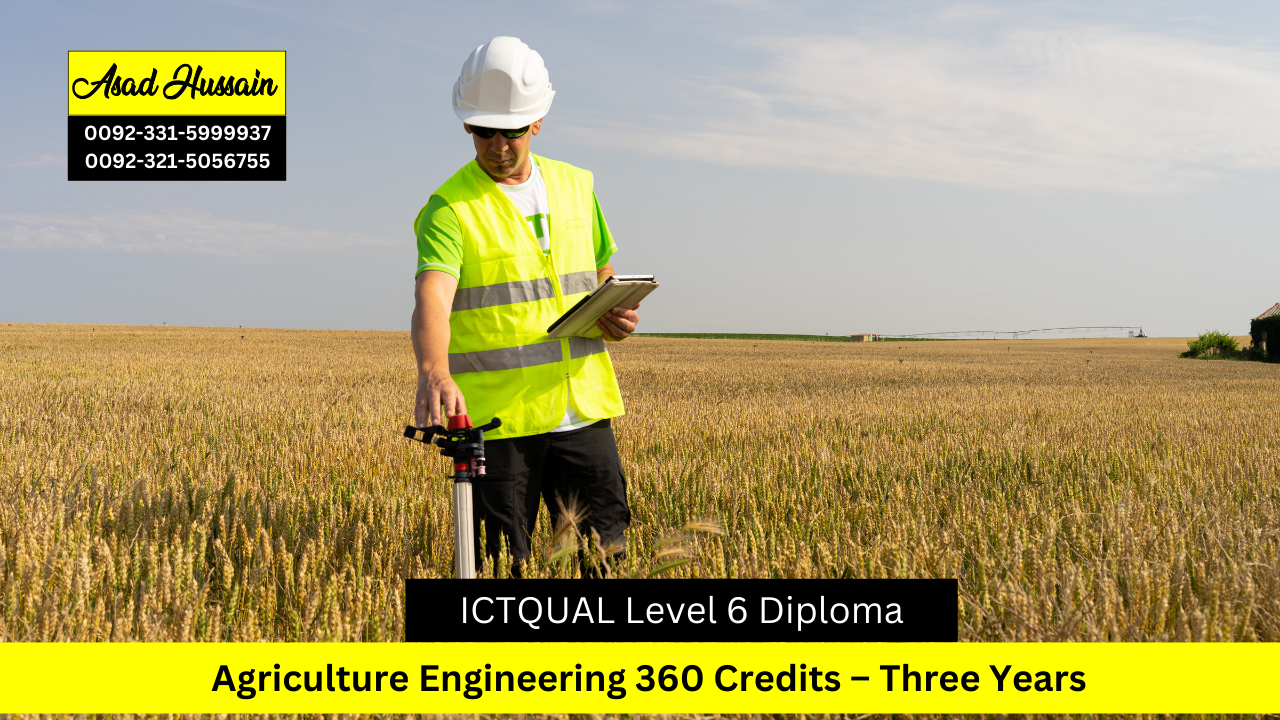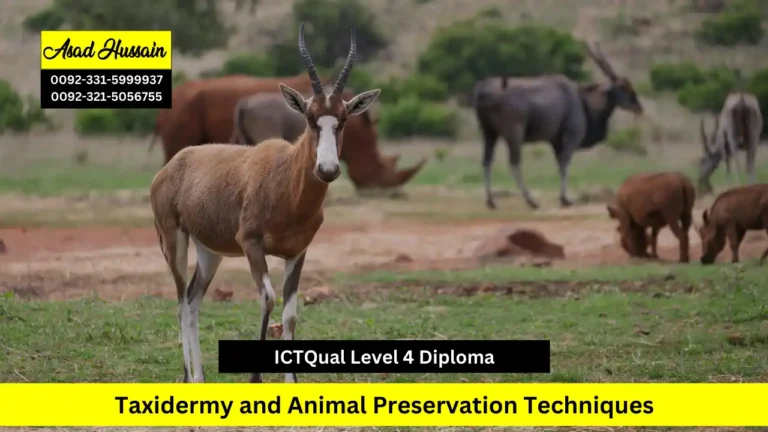Agriculture has always been an essential part of human civilization, providing food, raw materials, and employment. However, with the advent of new technologies, the sector has undergone a significant transformation. The integration of engineering and technology into agriculture has led to the emergence of agricultural engineering, a field that combines engineering principles with agricultural production. For those interested in pursuing a career in this rapidly evolving sector, the ICTQual Level 6 Diploma in Agricultural Engineering offers an advanced qualification that opens doors to diverse career opportunities. This blog will explore the value, curriculum, and potential career outcomes associated with this prestigious qualification.
The ICTQual Level 6 Diploma in Agricultural Engineering is a high-level vocational qualification designed to equip students with the knowledge and practical skills required to pursue a career in agricultural engineering. With 360 credits and a three-year duration, this qualification combines theoretical learning with hands-on experience, providing a well-rounded education in agricultural technology.
The ICTQual Level 6 Diploma in Agricultural Engineering (360 Credits) offers a comprehensive education for those looking to become leaders in the field of agricultural technology. With a strong curriculum, practical training, and global career potential, this qualification is a solid choice for anyone passionate about improving agricultural practices and solving global challenges in food production, sustainability, and technology. By completing this three-year diploma, students position themselves at the forefront of an industry that plays a pivotal role in feeding the world’s population while preserving natural resources.
Program Highlights
Year 1: Foundational Knowledge
- Introduction to Agricultural Engineering
- Basics of Soil Science
- Plant Science and Crop Physiology
- Introduction to Farm Machinery
- Principles of Irrigation and Drainage
- Environmental Science in Agriculture
- Mathematics for Engineers
- Fundamentals of Agricultural Economics
- Introduction to Renewable Energy in Agriculture
- Agricultural Chemistry
- Engineering Drawing and CAD
- Workshop Practices in Agricultural Engineering
Year 2: Intermediate Concepts and Applications
- Advanced Soil and Water Management
- Farm Power and Mechanization
- Agricultural Structures and Materials
- Irrigation Systems Design
- Introduction to Precision Agriculture
- Agricultural Waste Management
- Crop Protection Technologies
- Advanced Farm Machinery Operations
- Principles of Agro-Processing
- Renewable Energy Technologies in Agriculture
- Land Surveying and Mapping
- Practical Training in Agricultural Engineering
Year 3: Advanced Studies and Specialization
- Sustainable Agriculture Practices
- Advanced Irrigation and Drainage Engineering
- Farm Business Management
- Design of Agricultural Machinery
- Precision Farming Systems
- Advanced Soil Mechanics
- Climate-Smart Agriculture
- Renewable Energy Systems for Farms
- Post-Harvest Technology
- Automation in Agriculture
- Research Methods in Agriculture Engineering
- Final Project in Agricultural Engineering
To enroll in the ICTQual Level 6 Diploma in Agricultural Engineering (360 Credits) – 3 Years, applicants must meet the following entry requirements:
- Applicants must be at least 18 years old.
- A minimum of a Level 5 qualification (or equivalent) in a relevant field such as engineering, technology, or a technical discipline is required. Alternatively, applicants may have A-levels or equivalent qualifications, including Mathematics and English.
- Applicants should have a strong interest in both agriculture and engineering. They may be asked to submit a personal statement or attend an interview to assess their motivation and suitability for the program.
- While prior experience in agricultural engineering is not necessary, candidates with a background in mechanics, engineering, or agriculture will be viewed favorably.
- Non-native English speakers must provide proof of English language proficiency (e.g., IELTS or equivalent) to ensure they can fully engage with the course content.
Learning Outcomes for the ICTQual Level 6 Diploma in Agricultural Engineering (360 Credits) – Three Years
Year 1:
- Introduction to Agricultural Engineering
Understand the core principles of agricultural engineering and its pivotal role in modern farming. - Basic Principles of Engineering
Build a strong foundation in engineering principles, focusing on forces, motion, and energy. - Farm Machinery and Equipment: Fundamentals
Learn the basic functions, operations, and maintenance of farm machinery and equipment. - Mathematics for Agricultural Engineering
Apply mathematical concepts and techniques to solve practical problems in agricultural engineering. - Engineering Drawing and Design
Develop the ability to read and create engineering drawings and designs specific to agricultural applications. - Materials Science in Agricultural Engineering
Understand the properties and selection of materials used in agricultural engineering projects. - Engineering Mechanics
Apply mechanical principles to analyze and address challenges in agricultural systems and machinery. - Agricultural Systems and Technologies
Gain an overview of various agricultural systems and the technologies that optimize production. - Introduction to Precision Agriculture
Explore the basics of precision agriculture technologies and their role in improving farming practices. - Water Management Systems in Agriculture
Understand the design and operation of water management systems to enhance irrigation and water use efficiency in farming. - Soil Science and Engineering
Examine the relationship between soil properties and agricultural practices, focusing on engineering solutions for soil management. - Environmental Sustainability in Agriculture
Recognize the importance of sustainable practices in agricultural engineering to minimize environmental impact. - Engineering Safety and Risk Management
Learn how to identify, assess, and manage safety risks in agricultural engineering projects. - Introduction to Renewable Energy in Agriculture
Understand the fundamental principles of renewable energy technologies and their potential applications in agriculture.
Year 2:
- Advanced Farm Machinery and Equipment
Deepen knowledge of advanced machinery and equipment, emphasizing their efficient operation. - Automation and Robotics in Agriculture
Study how automation and robotics are transforming agricultural practices to improve efficiency and precision. - Agricultural Power Systems
Learn the design and implementation of power systems used in agriculture, including engines and electrical systems. - Irrigation and Drainage Systems
Develop expertise in designing and managing irrigation and drainage systems to optimize water use in agriculture. - Agricultural Structures and Building Design
Learn how to design agricultural structures such as barns, greenhouses, and storage facilities. - Crop and Livestock Production Technologies
Understand the engineering technologies supporting crop and livestock production, enhancing sustainability and productivity. - Precision Agriculture Techniques
Gain skills in implementing and managing precision farming technologies, including GPS and data-driven approaches. - Energy Efficiency in Agricultural Engineering
Learn how to optimize energy use in agricultural systems, reducing costs and environmental impact. - Agricultural Waste Management
Study methods for managing agricultural waste, including recycling and repurposing agricultural by-products. - Computer-Aided Design (CAD) for Agricultural Engineering
Master the use of CAD software to design agricultural engineering systems and machinery. - Renewable Energy Solutions for Farms
Learn to design and implement renewable energy solutions like solar and wind power for farm applications. - Surveying and Mapping in Agriculture
Develop proficiency in surveying and mapping techniques for land assessment and agricultural system design. - Agricultural Biotechnology and Engineering
Explore the integration of biotechnology and engineering to enhance agricultural production and sustainability. - Climate Change and its Impact on Agriculture
Examine the effects of climate change on agriculture and how engineering solutions can mitigate these challenges.
Year 3:
- Advanced Agricultural Systems Engineering
Apply advanced engineering principles to solve complex problems in agricultural systems, enhancing efficiency. - Agricultural Engineering Project Management
Gain essential project management skills, including planning, budgeting, and overseeing agricultural engineering projects. - Sustainable Agricultural Practices
Analyze and design sustainable agricultural practices that foster long-term productivity and environmental stewardship. - Advanced Irrigation and Water Conservation Technologies
Learn advanced techniques for irrigation design and water conservation, ensuring optimized water usage in agriculture. - Agricultural Equipment Maintenance and Management
Develop skills for the maintenance and management of agricultural machinery to ensure optimal performance and longevity. - Research Methods in Agricultural Engineering
Gain proficiency in research methodologies to solve engineering challenges in agriculture. - Innovation in Agricultural Engineering
Explore cutting-edge technologies and engineering innovations shaping the future of agriculture. - Professional Development and Industry Engagement
Develop key skills for professional growth, including networking, career planning, and industry collaboration.
The ICTQual Level 6 Diploma in Agricultural Engineering (360 Credits) – Three Years is designed for individuals who are passionate about both agriculture and engineering and wish to pursue a career in agricultural engineering. This course is ideal for:
1. Aspiring Agricultural Engineers
Individuals who wish to specialize in agricultural engineering and contribute to improving agricultural practices through technology and engineering solutions. This includes those interested in the design, operation, and maintenance of machinery, water management systems, and other agricultural technologies.
2. Engineering and Technology Enthusiasts
People with a background or interest in engineering, mechanics, or technology who want to apply their skills in the agricultural sector. The course offers a unique opportunity to combine engineering principles with agricultural production.
3. Farmers and Agricultural Professionals
Existing farmers or agricultural workers looking to enhance their knowledge of engineering systems, machinery, and technology to improve farm efficiency, productivity, and sustainability. This diploma can help individuals advance in agricultural management or transition to roles requiring technical expertise.
4. Graduates of Related Fields
Individuals with a Level 5 qualification (or equivalent) in engineering, technology, or a related field who want to deepen their understanding of agricultural engineering and pursue more advanced roles in the industry.
5. Professionals Looking to Specialize
Those working in related industries, such as environmental engineering, construction, or renewable energy, who wish to specialize in the agricultural sector to explore new career paths or broaden their expertise.
6. People Interested in Sustainable Agriculture
Individuals passionate about sustainability, climate change solutions, and environmentally friendly practices who want to apply their knowledge in creating more sustainable and energy-efficient agricultural systems.
7. International Students
This course is suitable for students from around the world, as agricultural engineering has global applications. The qualification can open doors to international opportunities in both developed and emerging agricultural markets.







